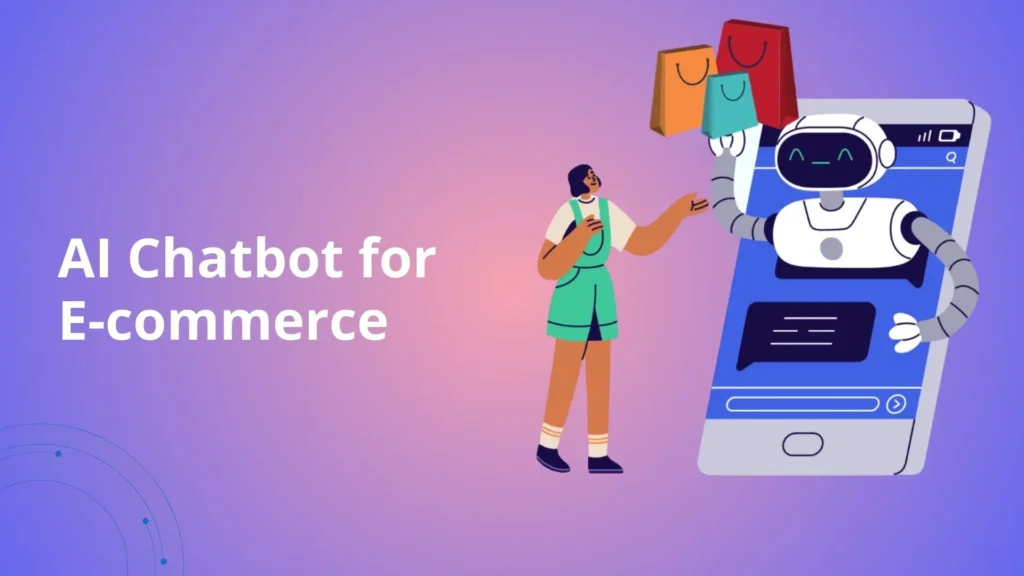The Future of E-commerce: Why AI Chatbots are a Game Changer
Consider losing a potential client simply because they could not locate the correct item or had difficulties during the checkout process. Is it not that frustrating? What if your AI chatbot for e-commerce could help clients immediately, offer tailored suggestions, and even retrieve abandoned carts? That is the potential of conversational AI for e-commerce.
According to Juniper Research, companies that use chatbots for e-commerce enjoy a 30% decrease in customer care expenses and a 67% boost in sales. E-commerce AI chatbots are now a need rather than a luxury for companies looking to increase conversions and provide a flawless buying experience as automation grows.
What is an AI chatbot for eCommerce?
A real-time AI-powered assistant that answers questions, makes suggestions and helps customers with their purchases is known as an e-commerce chatbot. By simulating human-like interactions, these chatbots use conversational AI for e-commerce to improve the efficiency and engagement of online buying.
Why do I need an e-commerce chatbot to enhance customer experience?
By providing smooth, real-time conversations that increase engagement, increase sales, and maximize marketing efforts, an e-commerce chatbot is crucial for improving the consumer experience. You need one for the following reasons:
1. 24/7 Customer Support
Consumers anticipate prompt responses and an AI chatbot for e-commerce guarantees that they get help whenever they need it, cutting down on wait times and raising customer happiness.
2. Personalized Shopping Experience
Chatbots that use conversational AI for e-commerce examine consumer behavior and preferences to offer personalized suggestions that boost conversion rates.
3. Streamlining the Checkout Process
Higher completed purchases can result from a well-optimized e-commerce chatbot’s ability to assist customers with checkout, respond to questions about payments, and lower friction.
4. A more personalized customer experience
Shopping becomes more interesting and customer-focused when AI chatbots use data to generate original conversations.
5. Increase sales
By offering product bundling, upselling, and cross-selling, the top AI chatbot for e-commerce may help companies increase their income.
6. Reduce the amount of abandoned shopping carts
Chatbots can encourage customers to finish their purchases by sending them personalized messages, special offers, and automatic reminders.
7. Reduce the number of returns
AI chatbots for e-commerce reduce return rates by assisting clients in making well-informed purchasing decisions with precise product recommendations and lucid descriptions.
8. Improve return on ad money spend
To maximize each ad dollar spent, an e-commerce AI chatbot interacts with visitors who were brought in by paid advertisements and makes sure they are given the correct information.
9. Re-engage customers
Chatbots may provide timely promos, offer loyalty benefits, and follow up with previous customers to keep them interested and coming back for more.
10. Step it up with chatbots
Businesses may automate customer service, increase retention, and enhance the overall purchasing experience by implementing chatbots for e-commerce. This makes chatbots essential in today’s digital economy.
Key Features to Look for in an eCommerce AI Chatbot
The following crucial components should be present in an AI chatbot for e-commerce to optimize efficiency:
1. Natural Language Processing (NLP)
NLP makes it possible for e-commerce chatbots to correctly comprehend customer queries, even when they are expressed in different ways. Conversational AI for e-commerce improves consumer happiness by providing relevant responses by identifying context, intent, and sentiment. An e-commerce chatbot, for instance, can understand mistakes, slang, and unfinished words rather than reacting in a robotic manner, which makes conversations seem more real.
2. Omnichannel Integration
Consumers purchase on a variety of platforms, including social media, messaging applications, and websites. Whether a consumer interacts with a brand via Facebook Messenger, WhatsApp, Instagram, or their website, the ideal AI chatbot for e-commerce should function across several platforms to guarantee a consistent purchasing experience. This guarantees that no possible lead is missed because their preferred platform is not supported.
3. Multilingual Support
As companies grow internationally, an AI chatbot for e-commerce should be multilingual to serve a wide range of users. By removing language barriers, this tool increases international conversions and enables brands to interact with consumers in their local tongue.
4. AI-Driven Analytics and Insights
Beyond simple automation, the greatest AI chatbot for e-commerce should offer useful insights about the preferences, behavior, and purchasing habits of its users. Businesses may improve their sales funnel, tailor interactions, and hone marketing campaigns with the aid of AI-driven insights. Businesses can continuously enhance customer service by using chatbots to monitor engagement metrics like response times, abandoned carts, and most commonly asked queries.
Suggested Read: https://heyeve.ai/blogs/how-ai-chatbots-streamline-business-operations/
Best AI Chatbots for eCommerce
Your company’s requirements will determine which of the many AI chatbot options is best for you. The best AI chatbots for e-commerce are broken down in detail below, with an emphasis on their special advantages and recommended applications.
Tidio– Affordable and Powerful for Small Businesses
Ideal for: Small businesses seeking a user-friendly chatbot with live chat and automation tools.
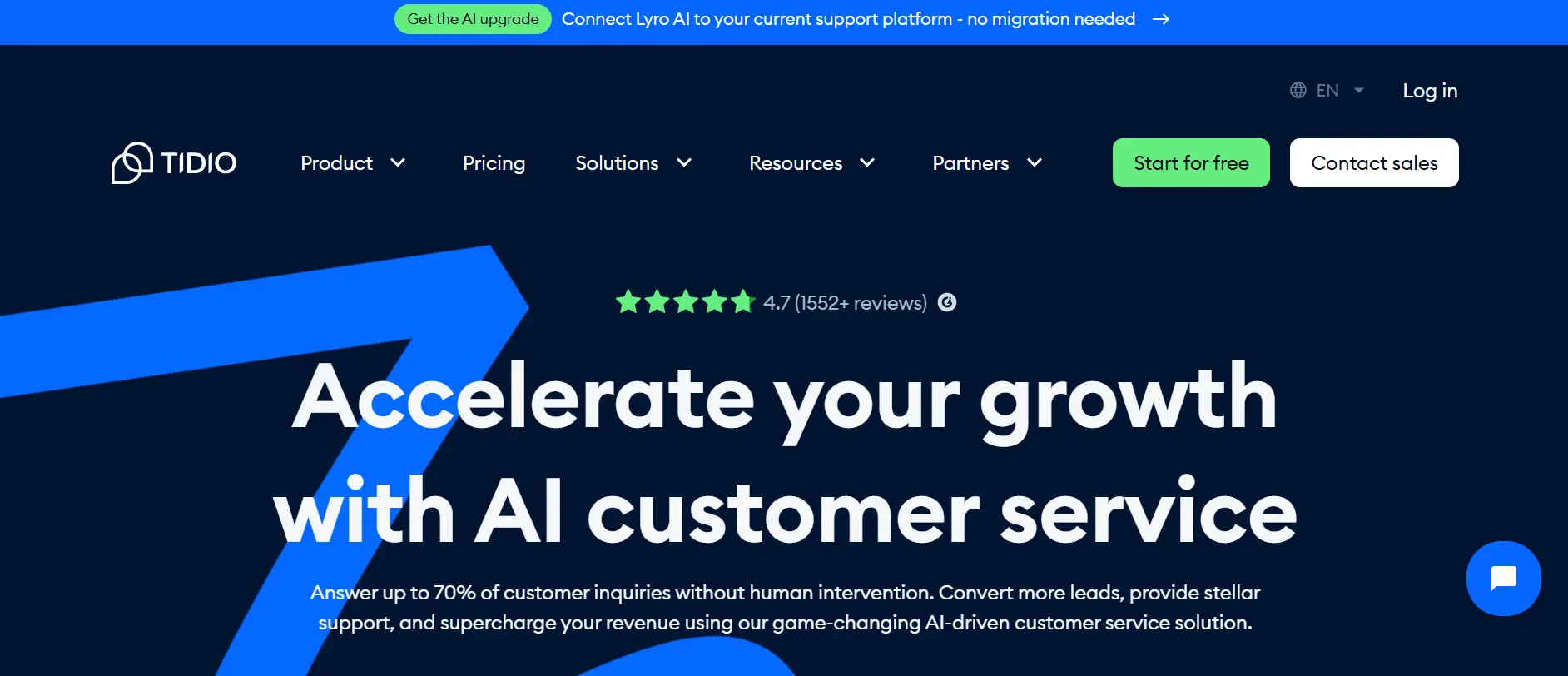
One of the most affordable AI chatbots is Tidio, which is ideal for small enterprises and e-commerce startups. It provides:
✔ AI chatbot integration with live chat, enabling smooth real-time communication.
✔ Quick setup without technological expertise using pre-built chatbot templates.
✔ Support for several channels as it integrates with email, Instagram, and Facebook Messenger.
✔ Automated answers – helps with lead generation and customer support.
Businesses looking to boost engagement and conversions without breaking the bank will find Tidio to be an excellent entry-level option.
Drift– Best for Conversational Marketing & Lead Generation
Ideal for: Companies looking to customize user experiences and generate leads.
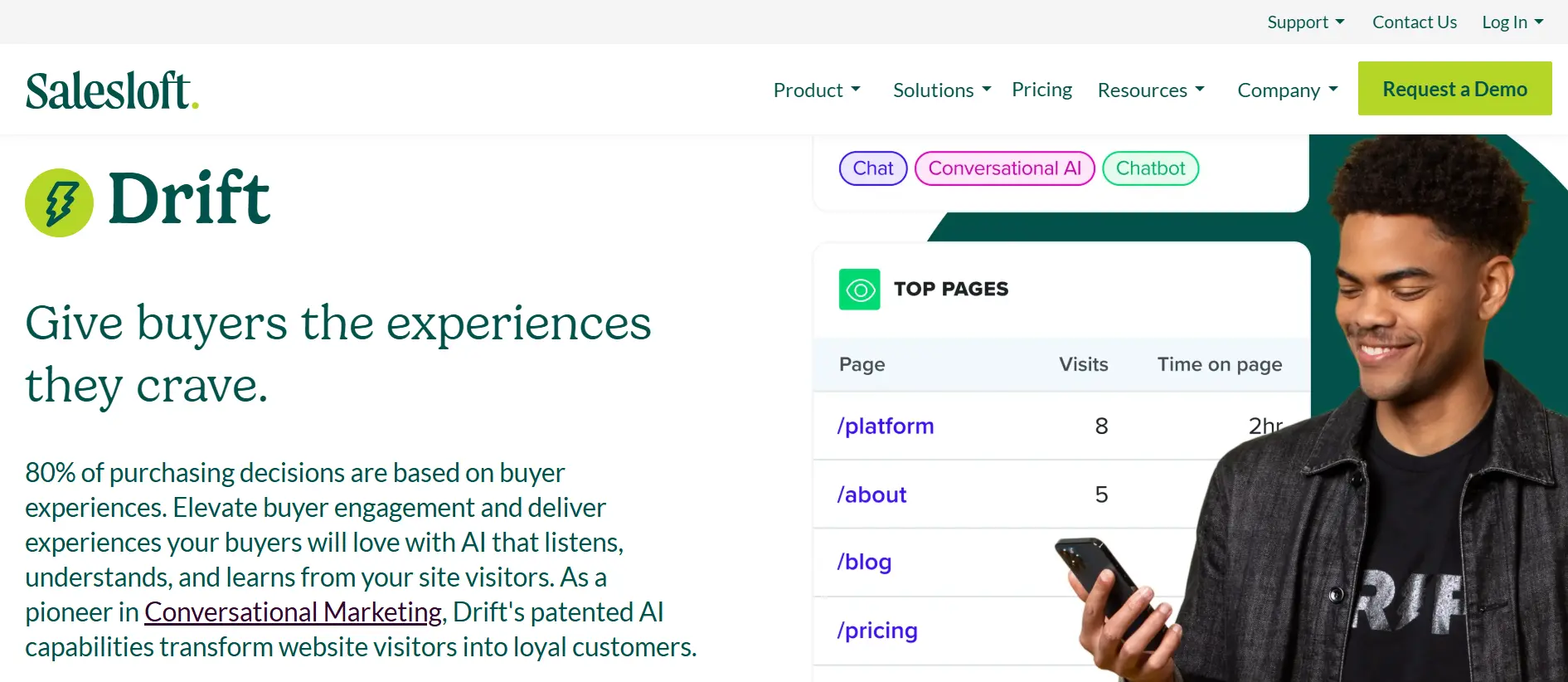
With an emphasis on conversational marketing, Drift uses AI-powered chat to assist companies in real-time interactions with prospective clients. It offers:
✔ Lead qualification: AI sorts potential customers according to their engagement and intent.
Sales teams can connect with high-value leads through automated sales outreach.
✔ Calendar booking integration: This feature enables users to set up meetings right away.
✔ Website visitor tracking: This allows chatbots to tailor their conversations according to user browsing habits.
Drift is perfect for companies who want to use AI chatbots to automate lead nurturing and boost conversions.
Zendesk– Best for Automated Customer Support
Ideal for: Online retailers seeking a chatbot that can be integrated with a full-service customer assistance system.
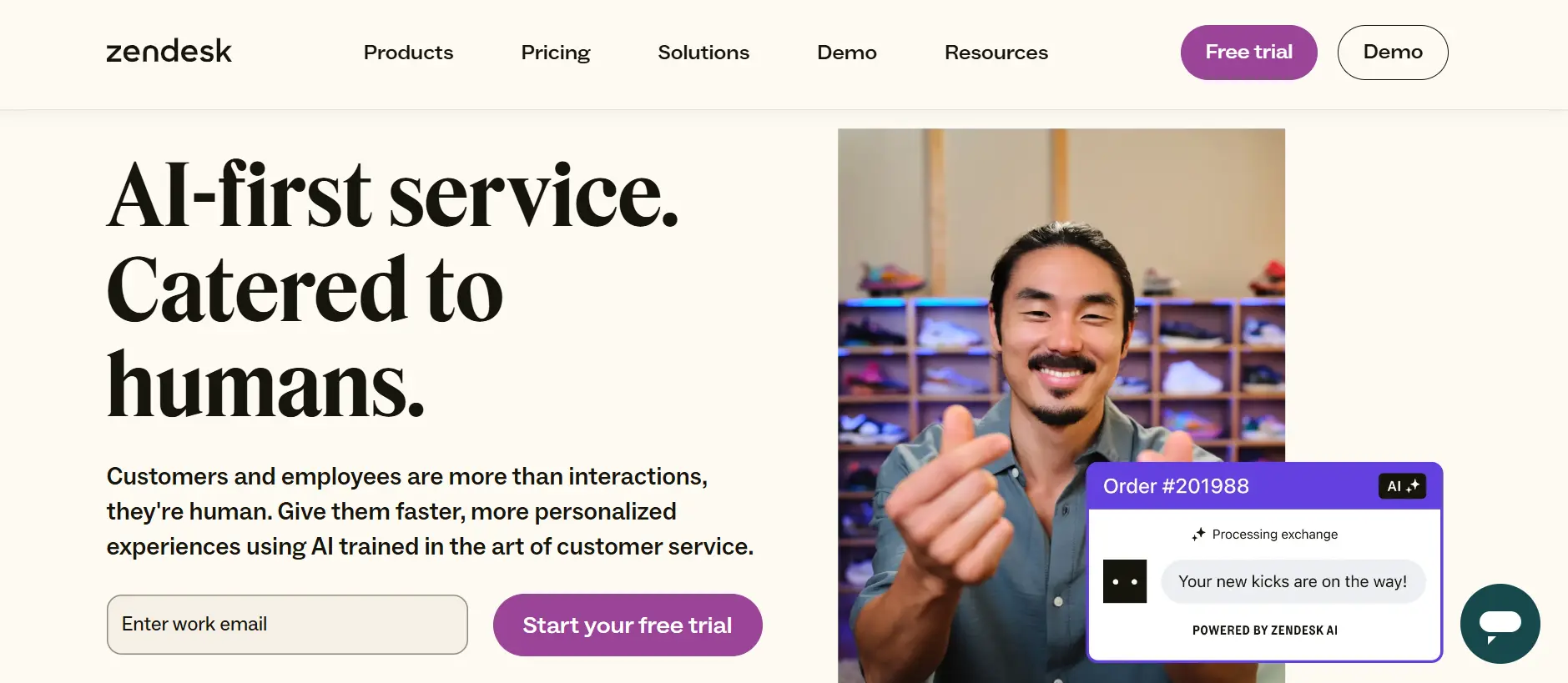
Zendesk’s AI chatbot enhances its well-known ticketing system by:
- Responding to customer inquiries around the clock, which lessens the strain on the support staff.
- Automating routine processes, such as tracking orders, issuing refunds, and responding to frequently asked questions.
- Integrating with current CRM systems to guarantee seamless AI-human agent interactions.
- Providing comprehensive insights by monitoring chatbot performance and consumer interactions.
Zendesk’s chatbot is a great option if automating customer care is a high priority for your company.
Intercom– Best for Sales Automation & Customer Engagement
Ideal for: Companies wishing to use AI to turn website visitors into paying clients.

Intercom uses conversation automation to increase sales and client retention. It has the following features:
- Behavior-based triggers: AI communicates with users according to how they browse.
- Smart lead routing: High-intent leads are routed to the appropriate sales professionals.
- Tailored suggestions: In-chat upselling and cross-selling of goods.
- Self-service solutions: Enable clients to resolve problems without assistance from a human.
Intercom is a formidable competitor for companies that prioritize lead generation, upselling, and sales automation.
Hubspot– Best for CRM & Sales Funnel Integration
Ideal for: Companies who require a chatbot with integrated marketing automation and CRM functionalities.
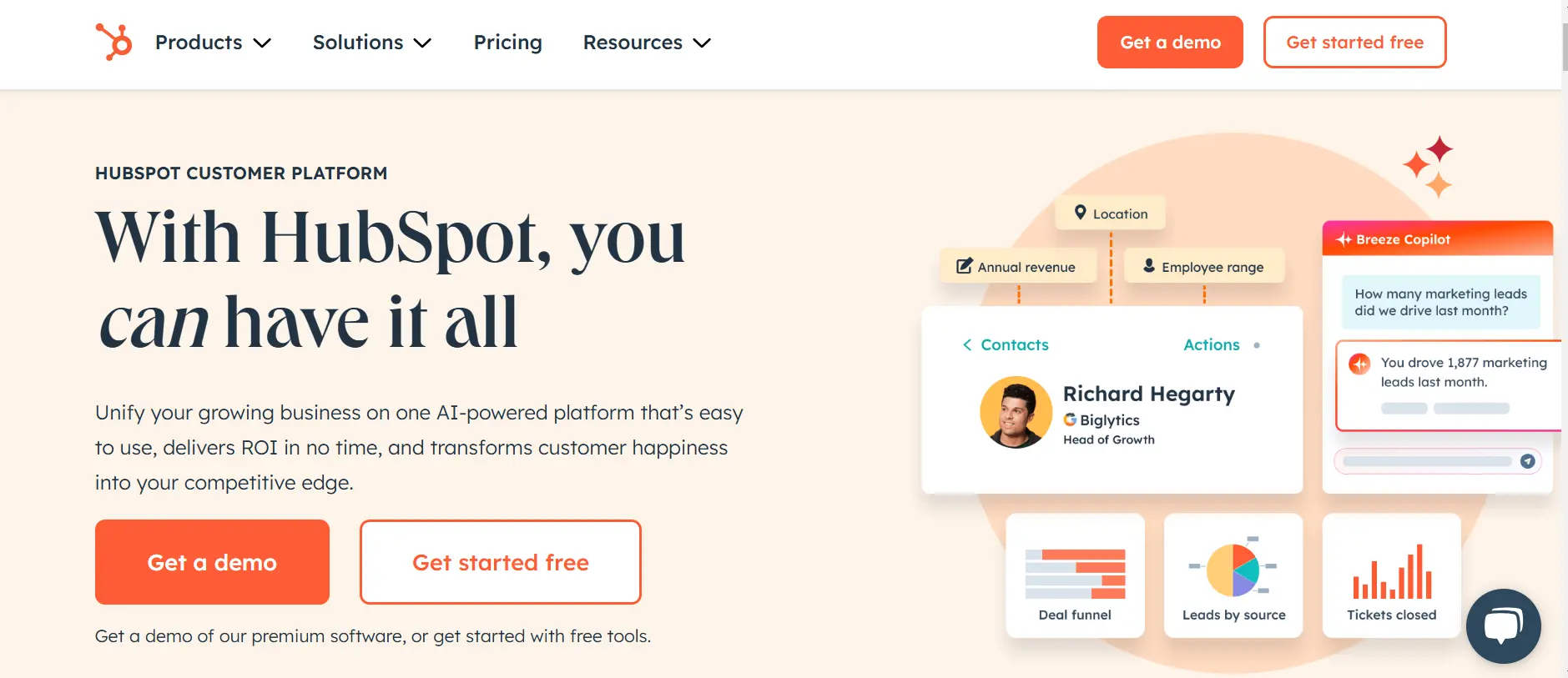
In addition to its comprehensive CRM platform, HubSpot’s AI chatbot assists companies with:
- Lead qualification and structured customer data collection.
- Customize discussions according to previous exchanges and past purchases.
- Automate follow-ups and client service without requiring human participation.
- Easily connect with sales funnels and email marketing.
The chatbot in your e-commerce business is a logical addition that improves automation and customer interaction if you utilize HubSpot’s CRM.
ChatFuel– Best for Facebook Messenger Automation
Ideal for: Companies who use Facebook Messenger to interact with clients.
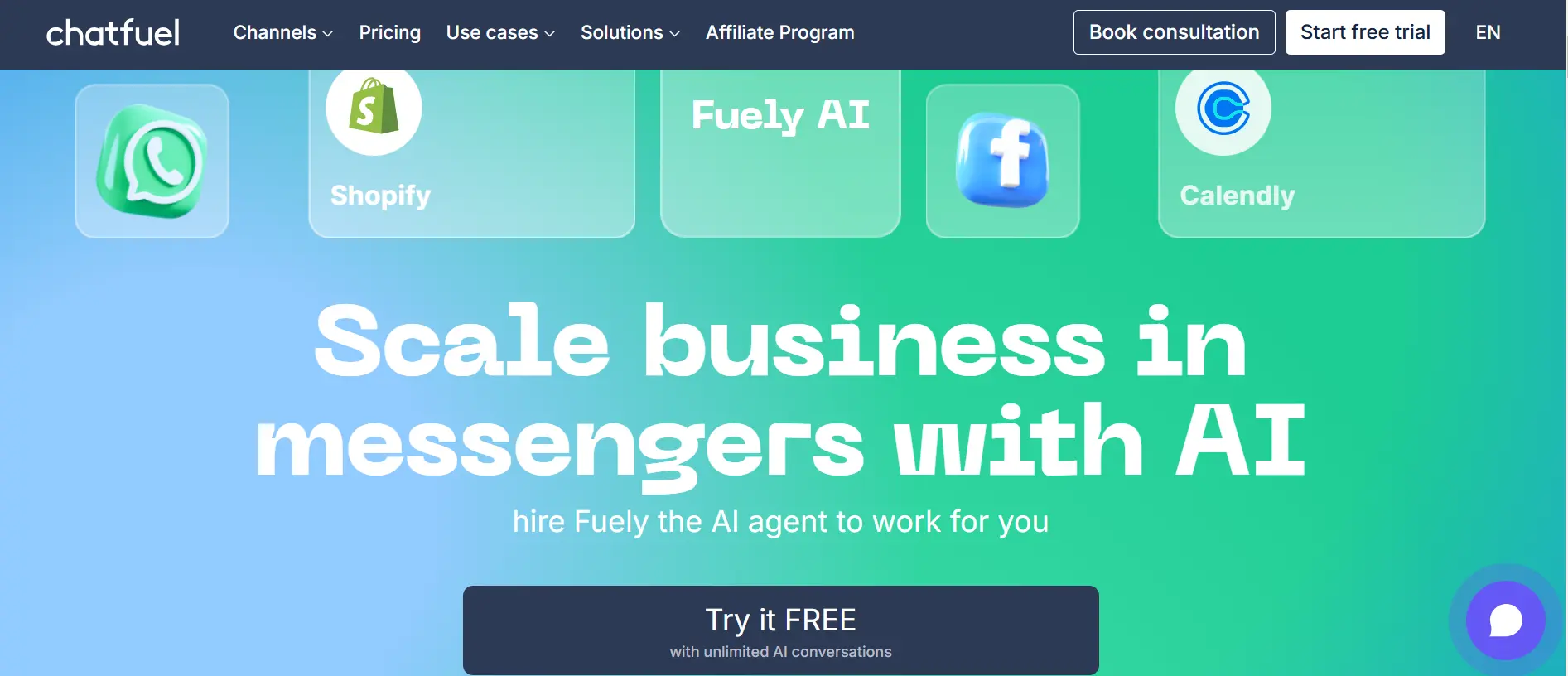
One of the most well-liked AI chatbots for Messenger automation is ChatFuel, which provides:
✔ Automated answers to frequently asked questions and client inquiries.
✔ Features for generating leads via integration with Facebook advertisements.
✔ AI-powered product suggestions derived from consumer inquiries.
✔ Smooth checkout procedure for e-commerce based on Messenger.
ChatFuel boosts engagement and conversions within Messenger for companies that specialize in social commerce.
Maisie
Ideal for: Small to medium-sized online retailers seeking customized AI-powered shopping assistants.
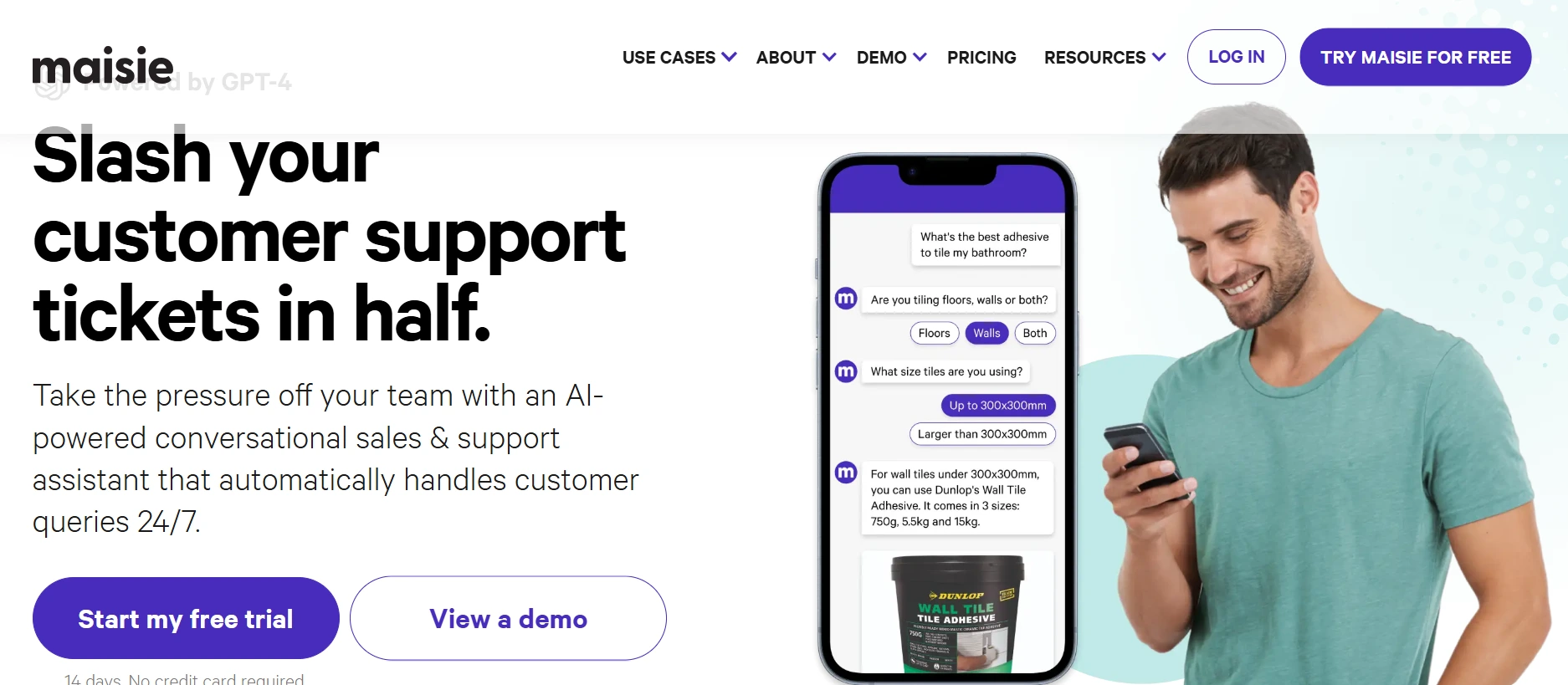
Maisie aims to boost engagement and revenue by providing:
- AI-powered product recommendations based on consumer behavior, Maisie aims to boost engagement and revenue.
- Email and Messenger recovery messages for cart abandonment.
- Smooth interaction with WooCommerce and Shopify.
- Segmenting customers to deliver customized messages.
Businesses looking for an intelligent AI chatbot that can increase conversions through personalization might consider Maisie.
Botpress– Best Open-Source Chatbot Platform
Ideal for: Companies seeking an open-source, fully configurable AI chatbot.
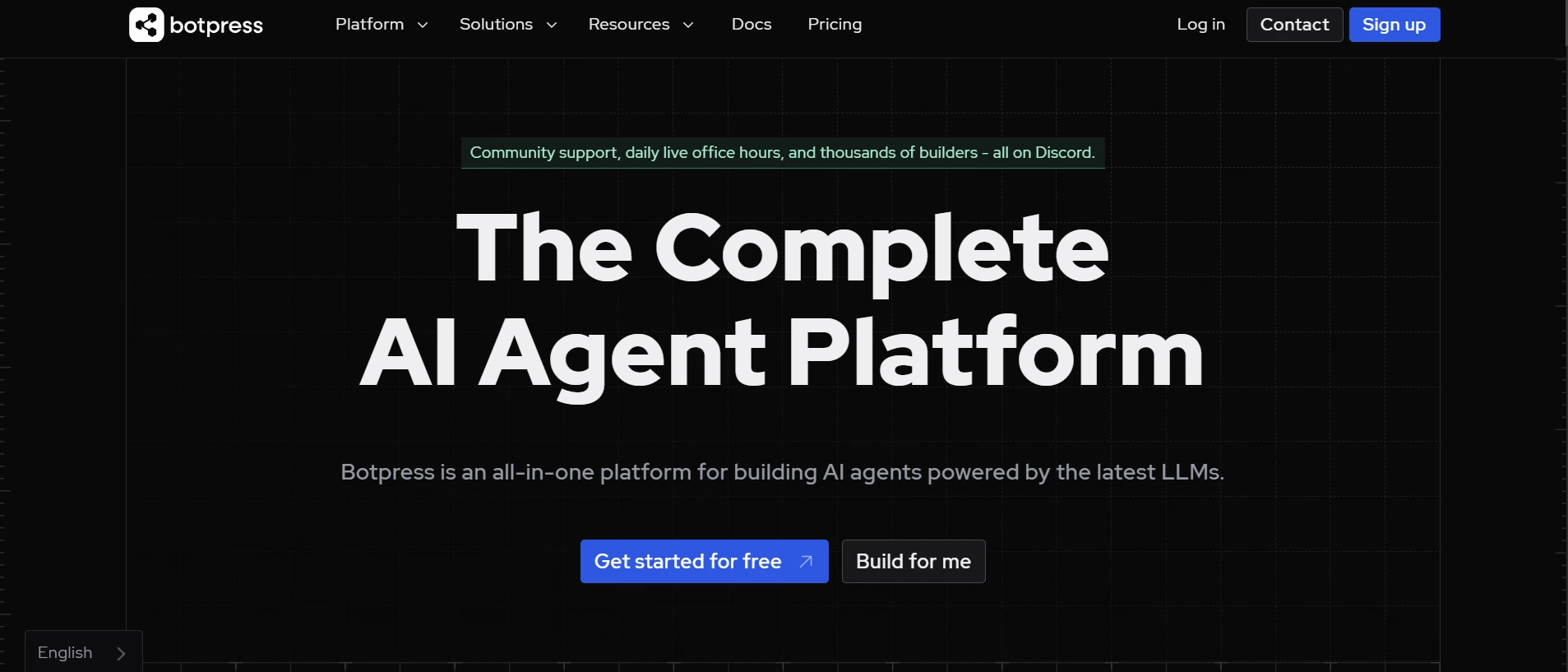
The distinctive feature of Botpress is that it enables companies to build AI chatbots from the ground up, providing:
✔ Total customization — Alter chatbot responses, behavior, and integrations.
✔ Multi-channel deployment: Utilize it on SMS, social media, applications, and websites.
✔ NLP skills and AI training: Improve chatbot comprehension.
✔ No vendor lock-in: Companies are in complete control of the programming that powers their chatbot.
For companies with in-house developers who desire complete control over their chatbot technology, Botpress is perfect.
Manychat– Best for Instagram & Messenger Automation
Ideal for: Companies that use Messenger and Instagram for e-commerce promotion.
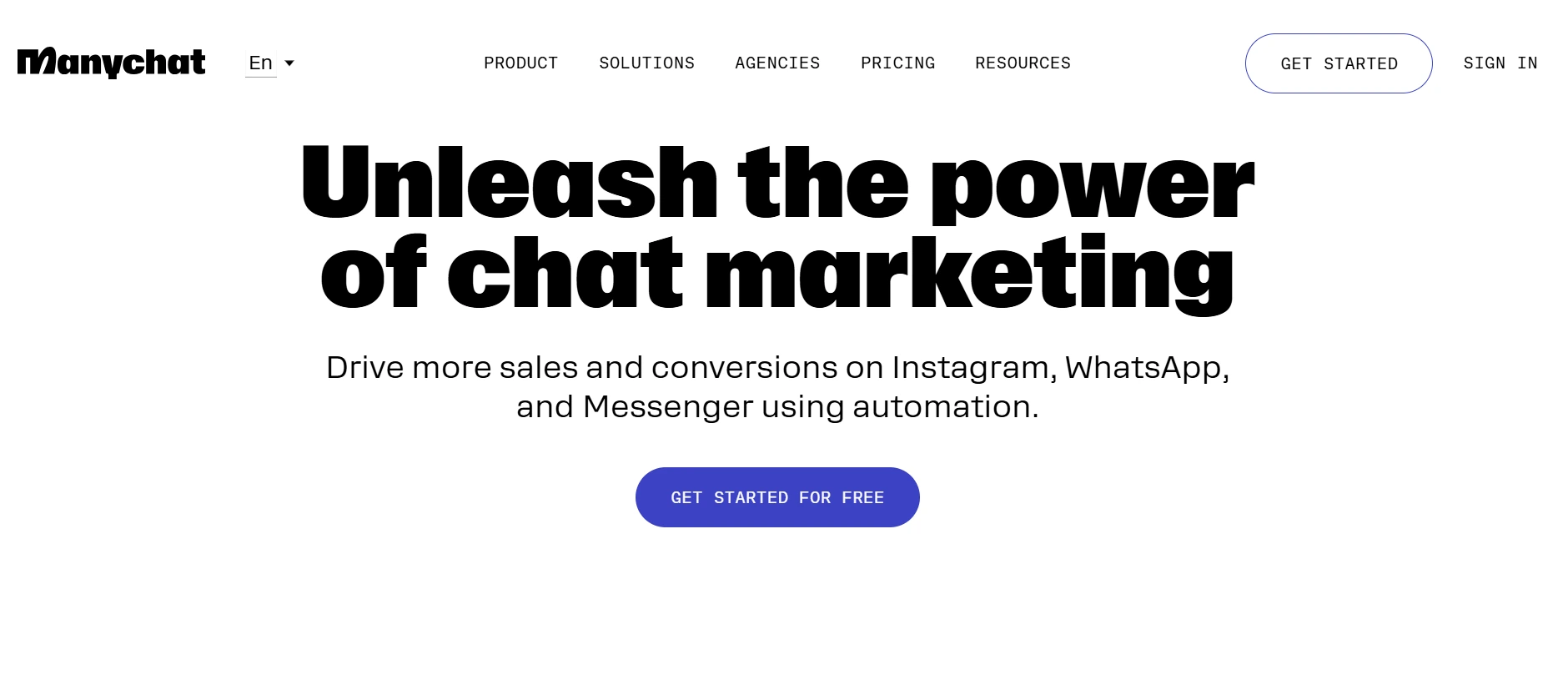
ManyChat is designed to help businesses with social media-driven sales by:
- Automating direct messages and comments – it promptly answers customer questions.
- Engage potential customers directly by converting Instagram comments into leads.
- Help clients navigate sales funnels, and qualifying leads before directing them to the payment page.
- For smooth transactions, integrate with Shopify and other e-commerce systems.
ManyChat is among the greatest AI chatbots for boosting conversions if your e-commerce company depends on social media marketing.
Snatchbot
Ideal for: Big companies and organizations in need of scalable chatbots with innovative AI features.

SnatchBot provides:
- Chatbot flows that are highly customizable for intricate business requirements.
- Sentiment analysis powered by AI to improve consumer interactions.
- Multi-channel implementation on messaging applications, websites, and other platforms.
- Compliance and security at the banking level for companies that handle sensitive data.
For businesses and organizations that need advanced AI chatbots, SnatchBot is ideal.
These companies are using e-commerce chatbots to grow their business
AI chatbots for e-commerce have been successfully deployed by several well-known firms to improve customer satisfaction and boost revenue. Here are a few instances:
Domino’s: Being available on multiple channels
Domino’s Pizza employs an e-commerce chatbot across many channels, such as SMS, Google Assistant, Facebook Messenger, and Alexa. With conversational AI, customers can order, track deliveries, and personalize their pizzas without having to navigate complicated websites or download time-consuming apps. Customers can place orders with ease thanks to this omnichannel strategy, which boosts convenience and client retention.
Michael Kors: Making online shopping more engaging
To offer a customized purchasing experience, luxury designer company Michael Kors uses an AI chatbot for e-commerce. The chatbot helps users by providing real-time availability checks, product recommendations, and styling guidance. Additionally, it incorporates social media, enabling users to find and buy products straight from Facebook and Instagram advertisements, boosting sales and consumer interaction.
Bol.com: Improve the experience throughout the entire customer journey
Bol.com, one of the biggest e-commerce sites in the Netherlands, uses a conversational AI e-commerce chatbot to improve the consumer experience. From assisting with post-purchase support to assisting with checkout and answering frequently asked questions, the chatbot helps clients during their whole shopping experience. Bol.com lowers return rates and raises customer happiness by providing tailored recommendations.
Read Also: https://heyeve.ai/blogs/ai-in-marketing-and-sales/
How to Implement AI Chatbots in Your eCommerce Store?
- Determine your customer journey’s pain points.
- Select the AI chatbot for e-commerce that best suits your requirements.
- Include the chatbot in all forms of communication.
- Use relevant consumer and product data to train your chatbot.
- Utilize AI-driven insights to track performance and improve replies.
AI Chatbots and eCommerce Trends
AI-driven chatbots are quickly changing the e-commerce scene. Companies may automate consumer interactions, boost engagement, and increase conversions by utilizing AI chatbots for e-commerce. Chatbots are becoming a vital tool for internet merchants, offering social commerce and tailored buying experiences. The three major trends influencing AI chatbots in e-commerce are listed below.
The Rise of Conversational Commerce
The integration of voice assistants, messaging apps, and chatbots for e-commerce to enable direct consumer interactions is known as conversational commerce. Customers may use chatbots to research things, get recommendations, and even finish purchases—all through natural conversations—instead of perusing websites or mobile apps.
Why Conversational Commerce is Growing:
✔ According to Facebook, over 50% of consumers would rather shop via chat apps than websites.
✔ According to Juniper Research, chatbot-driven transactions are anticipated to reach $142 billion by 2024.
✔ Companies can increase customer engagement and lower cart abandonment rates by 30% by implementing AI chatbots for e-commerce (Source: Business Insider).
How Companies Use Conversational Commerce:
- Customers may schedule beauty appointments over Messenger thanks to Sephora’s AI chatbot.
- Based on consumer preferences, H&M’s chatbot suggests outfits.
- Using voice assistants like Alexa, Domino’s chatbot allows customers to purchase pizza.
Businesses can make online purchasing quicker, easier, and more interesting for customers by implementing conversational AI for e-commerce.
AI Chatbots and the Future of Personalization
AI chatbots are essential to provide the individualized online shopping experiences that today’s consumers want. AI chatbots for e-commerce examine consumer information, interests, and behavior to offer personalized product recommendations, and deals, and help with purchasing.
AI Chatbot Personalization in E-Commerce:
✔ According to Epsilon, 80% of customers are more likely to buy from companies that provide individualized experiences.
✔ AI chatbots make product recommendations based on browsing and purchase history using real-time user data.
✔ Tailored promotions and discounts boost lifetime value and customer retention.
Personalization in E-commerce with AI Chatbots:
- Nike’s AI chatbot makes shoe recommendations based on a user’s running preferences and fitness objectives
- Alexa from Amazon makes product recommendations based on user search and purchasing history.
- Zalando’s AI chatbot analyzes a customer’s purchase history to offer tailored fashion recommendations.
Businesses may develop customized consumer experiences that increase conversions and brand loyalty by utilizing conversational AI for e-commerce.
Turn conversations into conversions with HeyEve.ai – the smartest AI chatbot for business automation.
The Role of AI Chatbots in Social Commerce
E-commerce chatbots are helping to boost sales in the rapidly expanding field of social commerce, which is the practice of shopping directly through social media platforms. Businesses can communicate with clients through chatbots on platforms like Facebook, Instagram, and WhatsApp. These chatbots can make immediate product recommendations and even complete transactions within the app.
Why AI Chatbots Are Essential for Social Commerce:
✔ According to Forbes, 79% of consumers find new items on social media.
✔ Compared to conventional email marketing, chatbots on Instagram and Messenger can produce engagement that is more than three times greater.
✔ Companies that use AI chatbots for social commerce increase customer satisfaction by 90% by reducing response times.
How Brands Use AI Chatbots for Social Commerce:
- Michael Kors’ Facebook chatbot allows users to peruse collections and buy products without ever leaving Messenger.
- Burberry’s WhatsApp chatbot offers exclusive product drops and fashion tips.
- Through direct messages, consumers can schedule shoe launches with Adidas’ Instagram chatbot.
Brands may engage with consumers in real time using e-commerce AI chatbots, converting social media followers into paying clients.
What’s Next for AI Chatbots and eCommerce Trends?
AI chatbots are always changing, and even more automation, customization, and smooth shopping experiences are in store for the future. The following are the latest developments in AI chatbots for e-commerce:
1. AI Chatbots with Voice Control
Voice search and AI assistants are being used by more consumers when they purchase online.
Before making a purchase, 40% of internet users use voice searches (Source: Think with Google).
2. Customer insights powered by AI
More sophisticated customer analytics will be made available by AI chatbots to assist firms in comprehending consumer purchasing patterns.
Real-time tracking of customer intent for improved marketing tactics will be possible thanks to predictive AI.
3. Smooth Chatbot-Human Transition
Companies will use hybrid chatbots, which seamlessly switch between AI and human workers to handle complex inquiries.
This is already accomplished by Zendesk’s AI chatbot, which recognizes when assistance from a human is required.
Challenges and Considerations in Implementing AI Chatbots
Even if AI chatbots have many advantages, companies still need to overcome some obstacles to guarantee a positive client experience and a successful rollout. These are the main things to think about:
1. Balancing Automation with Human Interaction
Though not all conversations should be automated, AI chatbots are capable of handling a high volume of client inquiries. Maintaining client pleasure and trust requires finding the ideal mix between AI and human assistance.
Key Challenges:
✔ If customers are unable to contact a human representative for complicated concerns, they may become upset.
✔ Customer relationships may suffer from impersonal encounters brought on by over-automation.
✔ Poor customer experiences might result from chatbots misinterpreting delicate or emotional requests.
Best Practices:
✅ Direct complicated inquiries to human agents via AI-powered escalation triggers. Improve problem-solving by offering a smooth transition from chatbot to human.
✅ Use hybrid chat models, in which humans address important issues and chatbots handle routine questions.
Example: Zendesk’s AI chatbot instantly switches the conversation to a human representative after identifying customer annoyance through sentiment analysis.
2. Data Privacy and Security Concerns
Large volumes of consumer data are gathered and processed by AI chatbots, which raises privacy and security issues. Retaining customer trust and compliance requires protecting user data.
Key Challenges:
- Chatbots manage private client data, such as payment information and personal information.
- GDPR, CCPA, and other data protection regulations must be followed.
- If AI models are not adequately managed, they may keep and misuse client data.
Best Practices:
✅ Make sure chatbot chats are encrypted from beginning to end.
✅ Adhere to data minimization guidelines by storing just the information that is required for customers.
✅ To ensure that chatbot operations are morally and legally sound, and adhere to the CCPA, GDPR, and other laws.
Example: Apple’s AI chatbot protects user privacy by processing data on-device rather than storing it in the cloud.
3. Ensuring Consistent and Accurate Responses
To improve customer satisfaction, AI chatbots need to respond with accuracy, dependability, and contextual relevance. Chatbots with inadequate training can result in inaccurate information and missed sales opportunities.
Key challenges:
- AI chatbots need to learn continuously to become more accurate.
- Inconsistent Responses can irritate customers and harm a brand’s reputation.
- Without adequate training data, chatbots may give inaccurate information or be unable to comprehend intent.
Best Practices:
✅ Use actual consumer encounters to train and update AI models regularly.
✅ Use human review processes to keep an eye on chatbot responses.
✅ Track chatbot performance and pinpoint areas for development using AI-driven statistics.
Example: Amazon’s AI chatbot increases accuracy by refining its response database in real-time based on consumer feedback, guaranteeing accurate and consistent conversations.
Having trouble turning website visitors into paying customers? Let HeyEve.ai interact and assist them with the checkout process!
Wrapping Up!
E-commerce AI chatbots are revolutionizing how companies communicate with their clientele. An AI chatbot for e-commerce is revolutionary, regardless of whether you want to increase sales, enhance customer satisfaction, or lower operating expenses. The moment has come to use conversational AI in e-commerce to maintain an advantage in the competitive world of e-commerce.
Frequently Asked Questions
Are AI chatbots worth it for e-commerce businesses?
Yes! Chatbots for e-commerce have the potential to boost revenue, cut expenses, and enhance consumer pleasure.
How do AI chatbots improve customer experience?
They provide smooth order tracking, individualized shopping recommendations, and round-the-clock assistance.
Which is the best AI chatbot for e-commerce?
It depends on your needs. HubSpot, Intercom, and Tidio are excellent options.
Can chatbots replace human customer service?
Not totally. They answer simple questions, but complicated problems still require human intervention.
How can I integrate a chatbot into my e-commerce store?
Select a chatbot supplier, link it to your platform, and teach it to answer consumer questions.

